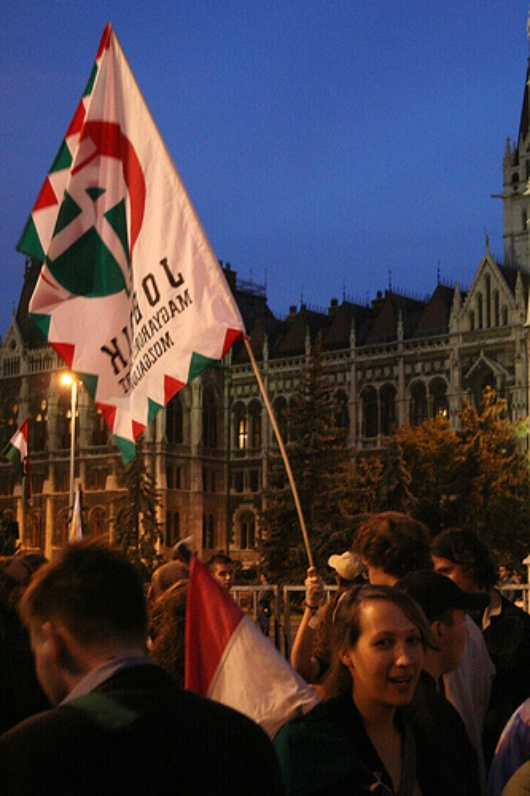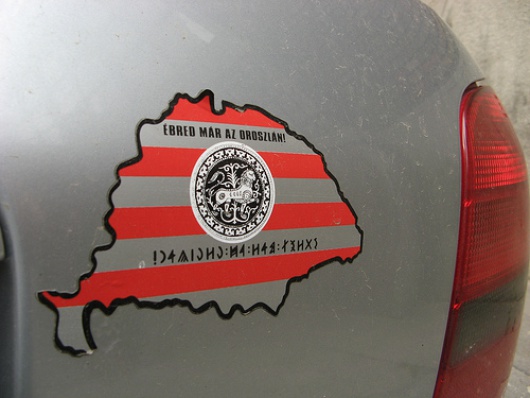
Jobbik: Hungary’s far right on the EU, Slovakia and elections
Published on
Fears of economic collapse and political implosion are causing alarming numbers to turn considerably rightwards in answer to their problems. Old debates are being dragged out of their graves, exacerbated by a looming financial crisis, rapidly deteriorating relations with neighbouring Slovakia and, most importantly, Hungary’s membership of the EU
Hungary is certainly a product of its varied, and often tragic, past. The fall of communism in 1989, followed fifteen years later by accession to the EU, should by all accounts have enamoured Hungarians with centrist governments and moderate politics. But a quiet riot, unfolding along the course of the Danube, threatens to sound louder.
Jobbik in June
 Zsolt Várkonyi, a senior member of Hungary’s far right party Jobbik, expects around 10% of the vote in June. ‘In certain questions we represent over 90% of Hungarians, like in the case of the Iraq war,’ he argues. ‘Despite overwhelming public opinion, all five parliamentary parties voted in favour of sending troops. The present political mechanisms and structures are the cause of Hungary’s problems.’ Few dispute the worrying and rising level of popularity that Jobbik currently enjoys (around 4%), but centrist politicians have been vociferous in their assertion that radical, racist parties will not be able to fulfil their promises. ‘European history has tended to favour extremists during economic crises,’ says Mátyás Eörsi, chairman of the Hungarian parliament’s European affairs committee. ‘It’s natural that extremist parties will be stronger than before, but democracy means that people can vote for good and bad groups. They will not be able to deliver.’
Zsolt Várkonyi, a senior member of Hungary’s far right party Jobbik, expects around 10% of the vote in June. ‘In certain questions we represent over 90% of Hungarians, like in the case of the Iraq war,’ he argues. ‘Despite overwhelming public opinion, all five parliamentary parties voted in favour of sending troops. The present political mechanisms and structures are the cause of Hungary’s problems.’ Few dispute the worrying and rising level of popularity that Jobbik currently enjoys (around 4%), but centrist politicians have been vociferous in their assertion that radical, racist parties will not be able to fulfil their promises. ‘European history has tended to favour extremists during economic crises,’ says Mátyás Eörsi, chairman of the Hungarian parliament’s European affairs committee. ‘It’s natural that extremist parties will be stronger than before, but democracy means that people can vote for good and bad groups. They will not be able to deliver.’
That, however, doesn’t mean that they won’t try. Jobbik has proved extraordinarily adept at capitalising on frustration with the country’s leadership. ‘The self-destructing political strategy chosen by the Hungarian political elite after 1990 led the whole nation to a dead end in all terms,’ contends Mr. Várkonyi, ‘be that in economics, the demographic situation, the gypsy problem, or foreign policy.’ The question of how such problems would have been dealt with remains open, but disillusionment with the liberal-socialist coalition government headed by outgoing prime minister Ferenc Gyurcsány has made Jobbik seem more mainstream. ‘Jobbik has a wide political agenda,’ says Daniel Fekete, a student from Szentendre, a town north of Budapest. ‘A lot of people looking for a fresh start have increased Jobbik’s support. They want to govern for a reasonable purpose.’
Slovakian bone
The main issue of contention between Hungary and Slovakia is the presence of a significant Hungarian minority in its northern neighbour. Many people in Slovakia, which was once part of Greater Hungary, resent their presence, and the situation isn’t at all helped by a seemingly hostile government in Bratislava. The ruling coalition includes the far right Slovak national party (SNS), whose leader Ján Slota once suggested that Slovakia roll its tanks into Budapest. With crucial elections to the European parliament due in June, a good result for the far right could pose a serious threat to solidarity within the EU.
 Hungarians feel let down by their political leaders. Balázs Rákóczi, an ethnic Hungarian born in Slovakia, paints a calm but pessimistic picture of Jobbik’s position on Slovakia. ‘It really depends on who you ask,’ he says. ‘People are so divided these days.’ The fact that such a division is present says enough about the situation. In most European countries, far right parties are an irritation to the tolerant consensus; here, they form a significant part of the debate. ‘Many Hungarians do not accept that Slovaks are no longer our citizens,’ says Dr. Eörsi. ‘But eastern Europe has two choices: we can fight each other, or respect each other.’ Unfortunately, some regard the latter as a legitimate choice. A football match in November 2008 between ethnic Hungarians and Slovaks saw Hungarian supporters beaten brutally by Slovak police despite smoke bombs being thrown at the visitors. Around sixty Hungarians were injured, but the police took no action against Slovak fans.
Hungarians feel let down by their political leaders. Balázs Rákóczi, an ethnic Hungarian born in Slovakia, paints a calm but pessimistic picture of Jobbik’s position on Slovakia. ‘It really depends on who you ask,’ he says. ‘People are so divided these days.’ The fact that such a division is present says enough about the situation. In most European countries, far right parties are an irritation to the tolerant consensus; here, they form a significant part of the debate. ‘Many Hungarians do not accept that Slovaks are no longer our citizens,’ says Dr. Eörsi. ‘But eastern Europe has two choices: we can fight each other, or respect each other.’ Unfortunately, some regard the latter as a legitimate choice. A football match in November 2008 between ethnic Hungarians and Slovaks saw Hungarian supporters beaten brutally by Slovak police despite smoke bombs being thrown at the visitors. Around sixty Hungarians were injured, but the police took no action against Slovak fans.
Negative EU
All this has begun to pose a serious problem for the EU. Faced with the biggest economic crisis since its creation, the EU is struggling with its single currency and emerging protectionism, and new member states are re-nationalising their political cultures. Jobbik is highly critical of membership, arguing it has diluted Hungarian national identity. ‘What we have experienced since our joining in 2004 is definitely very negative in all respects – to the Hungarian economy, to our cultural heritage, and to the demographic processes,’ says Mr. Várkonyi. ‘We have an overwhelming share of our economy, banking and trade in foreign hands, and more and more youngsters are leaving the country in order to work abroad.’
The question remains whether Hungarians (and indeed Europeans) will vote on domestic or continental issues. With Jobbik enjoying rising support and a government in freefall after the resignation of prime minister Ferenc Gyurcsány, Hungarian disillusionment may spread to other countries. The European parliament may remain a relatively weak institution, but as governments change and the council gradually comes to reflect better European sentiment, the EU could experience a shift rightwards and a devolution toward narrow nationalism.



